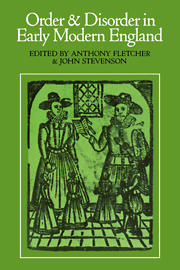Book contents
- Frontmatter
- Contents
- Notes on Contributors
- List of Abbreviations
- Preface
- Acknowledgements
- Introduction
- 1 Puritanism and Social Control?
- 2 Popular Religion and the Pilgrimage of Grace
- 3 Honour, Reputation and Local Officeholding in Elizabethan and Stuart England
- 4 The Taming of the Scold: the Enforcement of Patriarchal Authority in Early Modern England
- 5 Order and Disorder in the English Revolution
- 6 Drainers and Fenmen: the Problem of Popular Political Consciousness in the Seventeenth Century
- 7 Gender, Family and the Social Order, 1560–1725
- 8 The ‘Moral Economy’ of the English Crowd: Myth and Reality
- Index
- Index of places
3 - Honour, Reputation and Local Officeholding in Elizabethan and Stuart England
Published online by Cambridge University Press: 09 October 2009
- Frontmatter
- Contents
- Notes on Contributors
- List of Abbreviations
- Preface
- Acknowledgements
- Introduction
- 1 Puritanism and Social Control?
- 2 Popular Religion and the Pilgrimage of Grace
- 3 Honour, Reputation and Local Officeholding in Elizabethan and Stuart England
- 4 The Taming of the Scold: the Enforcement of Patriarchal Authority in Early Modern England
- 5 Order and Disorder in the English Revolution
- 6 Drainers and Fenmen: the Problem of Popular Political Consciousness in the Seventeenth Century
- 7 Gender, Family and the Social Order, 1560–1725
- 8 The ‘Moral Economy’ of the English Crowd: Myth and Reality
- Index
- Index of places
Summary
In Elizabethan and Stuart England, as in almost all settled states, order depended in the last resort less on courts and procedures than on officeholders and personal relationships. At the county level, government drew its strength from unity of purpose among groups of gentry who sat together on the bench and debated policy in their favourite hostelries. In the neighbourhoods, it drew its strength from the partnerships of able and vigorous JPs who were willing to be often in the saddle and constantly receiving constables and petitioners at their door. But officeholding was a public act which made men peculiarly vulnerable to defamation. Recent work on this period has established that men and women at all levels of society showed extreme sensitivity over slights against their good name. Office in county government – as a JP, a subsidy commissioner or a deputy-lieutenant – exposed a man on two fronts. While his credit among his peers might be elevated by their appreciation of his concern for justice, it could also be blotted if it became known or was believed that he abused his authority. His standing among the people could sink if gossip about his conduct, whether malicious or well founded, was allowed to spread unchecked. The theme of honour and reputation therefore provides an entry to the social world of Elizabethan and Stuart government, a world of ambition and assertiveness, sometimes of feud and personal conflict. Prestige not wealth was the principal reward of office.
- Type
- Chapter
- Information
- Order and Disorder in Early Modern England , pp. 92 - 115Publisher: Cambridge University PressPrint publication year: 1985
- 16
- Cited by



